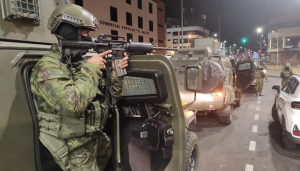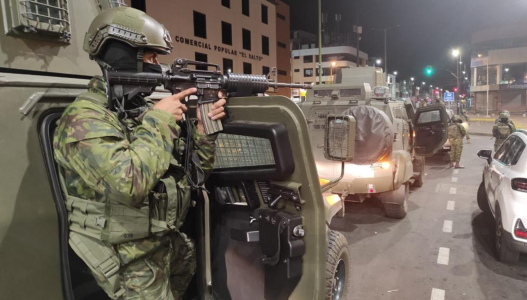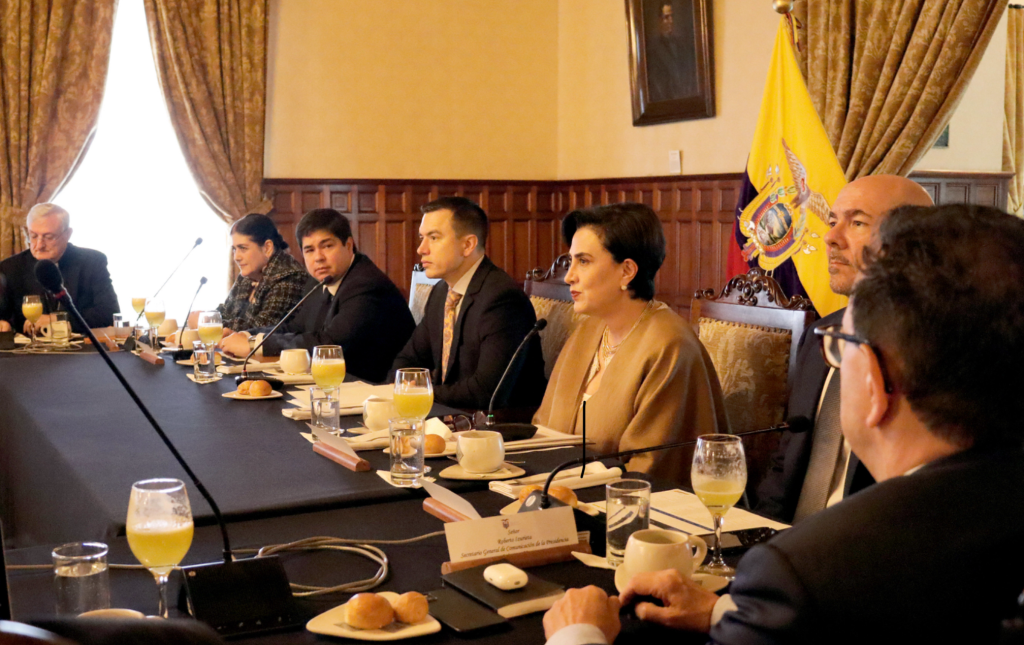
HEAD OF U.S. SOUTHERN COMMAND TO VISIT ECUADOR, COUNTRY THAT WILL RESTRICT ENTRY OF FOREIGNERS
General Laura Richardson, head of the U.S. Southern Command, will arrive in Ecuador, on a date not yet disclosed until this Friday, January 12, 2024.
She will be accompanied by high-ranking officials from the counter-narcotics department and the diplomacy of Joe Biden’s government. They are the head of the State Department’s counter-narcotics bureau, Todd Robinson, and the Deputy Assistant Secretary for the Southern Cone, Kevin Sullivan.
State Department spokesman Mathew Miller said in a statement that the Biden administration will work with Quito to strengthen its “law enforcement cooperation through security assistance programs”.
The Ecuadorian government declared the existence of an internal armed conflict due to the wave of terrorist attacks that occurred at the beginning of the week. By means of an executive decree, President Daniel Noboa established that 22 criminal gangs were considered terrorists. Thus, the Armed Forces were empowered to take control of the fight against these groups and turn them into military targets.
In an interview on FM Mundo this Thursday, Noboa specified that Ecuador is working with 38 nations that will provide international assistance and has already accepted the support of Argentina and the United States.
The Argentinean government of Javier Milei had mentioned its willingness to send security troops to Ecuador to help in the fight against gangs officially considered terrorists. Details of this contingent and when it will arrive in the country are not yet known.
In that radio interview, Noboa said: “We need military support in terms of manpower, soldiers, as well as assistance in intelligence, artillery and equipment”. A day before, on Wednesday, Noboa assured that Ecuador is “in a state of war and we cannot give in to these terrorists”.
INTELLIGENCE SUPPORT
Spokesman Miller explained that Washington will also send personnel to Quito to help Ecuadorian authorities conduct investigations against the criminals. “The United States will increase intelligence sharing, cooperation to combat cybercrime and assistance to implement prison reforms,” he said.
The FBI has recently supported Ecuador’s Attorney General’s Office in the investigation into the death of Fernando Villavicencio, a presidential candidate assassinated in the midst of an election campaign on August 9, 2023.
BRAZIL ALSO OFFERS ASSISTANCE
Andrei Rodrigues, general director of the Brazilian Federal Police, informed in an interview with EFE agency, that the institution made itself available to the Ecuadorian government to help mitigate the wave of violence that has been unleashed.
Rodrigues said that the idea is to achieve “a great environment of cooperation in America”. That is why he also offered the support of the Police Community of the Americas (Ameripol), of which he is the executive secretary.
“Much more than arms and ammunition, intelligence is important,” said Rodrigues, who also indicated that since last October an Ecuadorian police officer has been at the Center for International Police Cooperation (CCPI) in Rio de Janeiro, which allows for a fluid exchange of information, he said.
DISTURBANCE IN RUSSIA
The Russian ambassador in Quito, Vladimir Spinchan, said that it would be considered by his government “an unfriendly step” if what President Noboa had informed in the past few days becomes a reality: that he will exchange with the United States “Ukrainian and Russian scrap metal for USD 200 million in modern equipment”.
Noboa said last Tuesday that this exchange will take place at the end of this month.
Sprinchan said the U.S. has no need for such weaponry. He added that Russian-made military equipment “is needed by those who know how to handle it”. Russia considers that this step, if taken, constitutes a violation of Noboa’s declared position of neutrality.
BORDER RESTRICTIONS
During the state of emergency and the recognition of the existence of an internal armed conflict in Ecuador, the Ecuadorian government will require all foreigners entering through the borders with Colombia and Peru to present a criminal record certificate.
The decree establishing the state of emergency states that it will last 60 days.
Ecuador’s Interior Ministry said that the measure seeks to “prevent and control the entry of individuals who constitute a threat or risk to public security”.
Ecuador will consider valid only certificates that are “duly apostilled”. The criminal record certificate must be issued by the country of origin or where the applicant has resided for the last five years.
Children and adolescents accompanied by a relative within the fourth degree of consanguinity or second degree of affinity will be exempt from presenting it.
REPATRIATION OF COLOMBIAN PRISONERS IS NOT EASY TO ACHIEVE
The president of Colombia, Gustavo Petro, said on Tuesday that he was attentive to all the support requested by the government of Ecuador. In turn, President Daniel Noboa said that the repatriation of 1,500 Colombians imprisoned in Ecuador was being coordinated with Colombia.
In view of this, the Colombian authorities stated that if what they consider an expulsion were to take place, it would be a unilateral decision of Ecuador.
In an official statement, Bogota recalled that the repatriation of its citizens between Colombia and Ecuador is governed by the Agreement on Transit of Persons, Vehicles, River and Maritime Vessels and Aircraft of April 18, 1990. And that this agreement states that repatriation is an individual process, not massive, that responds to objective criteria, “not to the simple will of the States parties”.
One of the requirements is that there must be not only the acceptance of the states in each case, but also the consent of the prisoners.
Ecuadorian jurists explained in the Guayaquil newspaper El Universo that there are two possible procedures. One for those who have a final conviction and another for those who do not have a conviction.
For the former, the Strasbourg Convention and the Inter-American Convention on the Enforcement of Sentences in Foreign Countries can be applied. Both instruments, however, require that the prisoner agrees to the transfer and that there is a formal acceptance by the states, among other requirements.
In the case of those who still do not have a final sentence, what could occur is an expulsion by unilateral decision of Ecuador. This would imply, basically, leaving the prisoners at the border and letting them go free.
————
This text is free to use. If you use it, please cite EditoRed.



